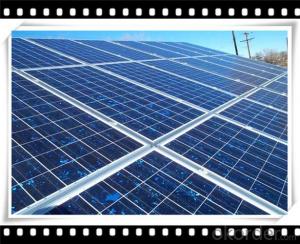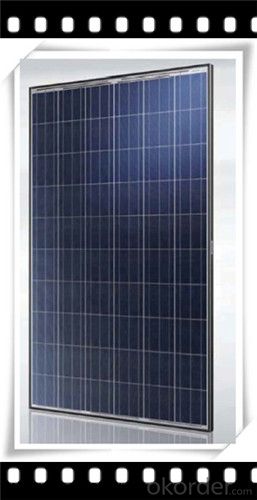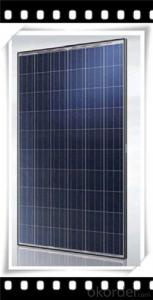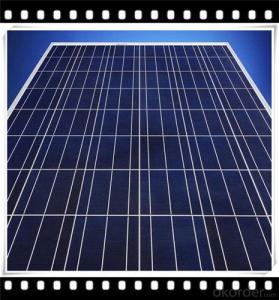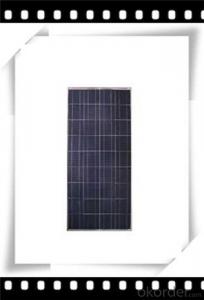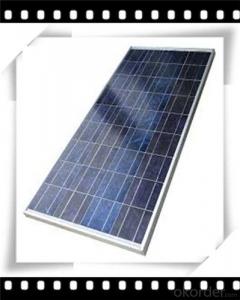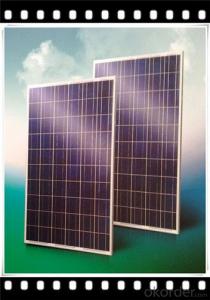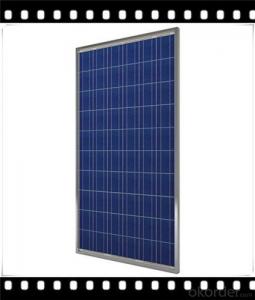Virginia Beach Solar Panels 40w Poly Mini Solar Panel Hot Selling CNBM Solar Panel
- Loading Port:
- Qingdao
- Payment Terms:
- TT OR LC
- Min Order Qty:
- 10 set
- Supply Capability:
- 300000 set/month
OKorder Service Pledge
OKorder Financial Service
You Might Also Like
Polycrystalline Solar Modules
CNBM offers a range of small, medium and large polycrystalline solar modules, designed for a range of requirements.
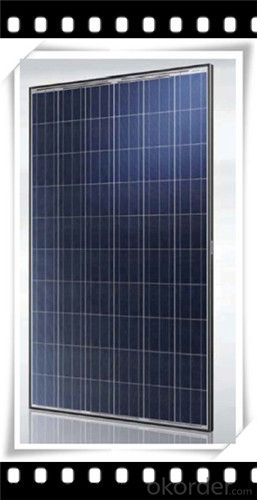
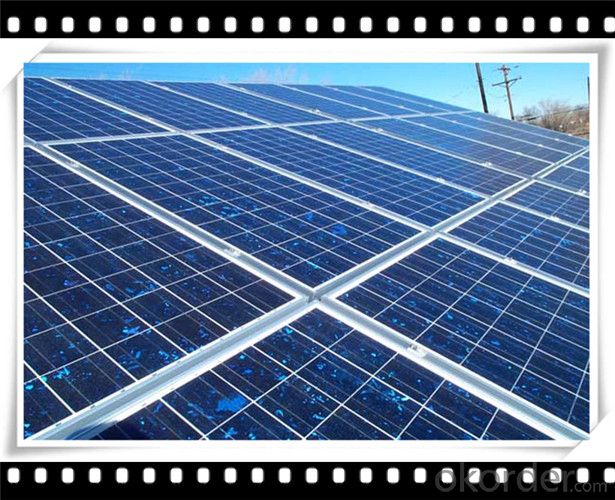
Specifications:
+/-3% |
Polycrystalline silicon solar cells (156 x 156mm) |
60 (10 x 6) |
1650 x 990 x 40 |
25.5 |
Limits:
Operating Temperature | -40~+85? |
Storage Temperature | -40~+85? |
Maximum System Voltage | 1000 VDC max. |
Hail Impact | Diameter of 28mm with impact speed |
Temperature and Coefficients:
NOCT | 48C+/-2? |
Voltage temperature coefficient (%/K) | -0.35 |
Current temperature coefficient (%/K) | 0.05 |
Power temperature coefficient (%/K) | -0.45 |
Characteristics:
Model: | SGM-200P | SGM-210P | SGM-220P |
Max-power voltage Vmp (V) | 29.2 | 29.4 | 29.41 |
Max-power current Imp (A) | 6.85 | 7.14 | 7.48 |
Open-circuit voltage Voc (V) | 36.5 | 36.69 | 36.9 |
Short-Circuit Current Isc (A) | 7.28 | 7.6 | 7.93 |
Max-power Pm(W) | 200 | 210 | 220 |
Model: | SGM-230P |
Max-power voltage Vmp (V) | 29.8 |
Max-power current Imp (A) | 7.72 |
Open-circuit voltage Voc (V) | 37.31 |
Short-Circuit Current Isc (A) | 8.19 |
Max-power Pm(W) | 230 |
STC: Irradiance 1000W/m2, module temperature 25?, AM-=1.5
Poly Crystalline Solar Panels Specifications Range
Maximum Power (Pm) | Dimension | Weight | Operating Voltage (Vmp) | Operating Current (Imp) | Open Circuit Voltage (Voc) | Short Circuit Current (Isc) |
0.45W | 140x80x10mm | 0.08kg | 3.3V | 150mA | 4.6V | 160mA |
1.0W | 162x140x10mm | 0.16kg | 7.5V | 150mA | 10.3V | 160mA |
4.5W | 269x251x23mm | 0.8kg | 16.5V | 0.27A | 20.5V | 0.3A |
10W | 420.1×268.9×22.6mm | 1.92kg | 17.5V | 0.58A | 20.5V | 0.6A |
20W | 425x502x50mm | 3.0kg | 16.8V | 1.19A | 21.0V | 1.29A |
30W | 593x502x22.6mm | 3.9kg | 16.8V | 1.78A | 21.0V | 1.94A |
40W | 655x537x50mm | 5.75kg | 17.3V | 2.31A | 22.1V | 2.54A |
50W | 839x537x50mm | 6.0kg | 17.5V | 2.9A | 21.8V | 3.17A |
65W | 1111x502x50mm | 7.2kg | 17.6V | 3.69A | 22.1V | 3.99A |
80W | 1204x537x50mm | 7.7kg | 17.6V | 4.55A | 22.1V | 4.8A |
- Q: I know that there is a life expectancy for solar panels, and I suppose, the technology involved. Any information?
- Ive been using the same solar panels for 5 years, have move a few times so they last a lot longer than the roofs weve had over us. I am teaching my kids how to build wind generators, because we keep having power failiures when the wind blows. and recently its got very windy. I charge banks of battery's and keep my office running from dc-ac converters.
- Q: Please, I want a good definition. :DD
- Solar panels are used to gather solar energy from the sun. Solar panels help maintain a clean and sustainable environment; using solar panels to gather the sunlight is a type of renewable energy. After collecting sunlight, the panels convert the energy into electricity
- Q: Can solar panels be integrated into building materials?
- Yes, solar panels can be integrated into building materials. This integration is commonly known as building-integrated photovoltaics (BIPV), where solar panels are designed to function as part of the building's structure. This allows for seamless incorporation of solar energy generation into the building's overall design, enhancing energy efficiency and aesthetics.
- Q: I want to buy a solar panel to charge deep cycle batteries and charge electronics off the DCB. I don't know how to wire everything up though or what materials ill need. Inverter? Gauge of the wire? Ampmeter?
- It does not matter if you father is a electrician he must be a fully qualified solar installer or you will not receive any money from the government. You need more than just solar panels you need regulators, grid interaction devices and array controller. 5KW installation is large and will cost around $5000 for the panels then around 5000 for controllers and equipment needed and then there are the basic materials such as rails, junctions, cables etc Total cost is approx $5,000
- Q: Just wondering if it is possible to recycle solar panels and where that would be done. If it is possible, is there a money refund in return. Or would it be better to just take the metal off and get a refund in that way? Looking for basically any answer here.
- It looks like you can. Although, I haven't been able to find like a drop off location or anything like that. Here's two phone numbers if you want to ask them. It's Sunday, and I'm assuming they're closed, otherwise I'd just call for you. San Diego (69) 562-783 or Berkeley (50) 843-3. It's a company called Borrego Solar. They look like a BIG solar company that specializes in commercial, residential and public sector turnkey, grid–connected solar electric systems. With over 25 years of experience. They sound like they would know about recycling, and at least be able to give you more information. I think because it's such a specialized item that is being recycled, there aren't going to be many options/drop off locations. Which ever option you choose (disassemble, or recycle as a whole) might depend on if you're looking to save the environment or make a buck. I got some information from the first link below, and the second link is to that Borrego company.
- Q: I would like to know how do you build a solar panel?
- There are several types of solar panels. If you mean photovoltaic panels for generating electricity, that is a really advanced project that few amateurs are equipped to do. In the long run, it will be a lot cheaper and easier to buy factory made PV panels. You can try building one by sandwiching an array of photovoltaic cells between a sheet of glass or plexiglass and a sheet of aluminum. Remember that this assembly must be able to withstand great heat, and it must be sealed to make absolutely sure it does not leak. So basically, you need to lay out the PV cells and wire them together to get the desired voltage and current, with some arrangement to allow the wires to extend outside without leaking. Then you enclose the panel around all four edges with aluminum channel and seal with silicone sealer. Lay it on thick and test thoroughly with water hoses to eliminate all leaks. As mentioned, it's easier and cheaper to buy them factory made. If you mean a heat collector for a solar house heating system or hot water system, that is just a matter of building a thin, flat aluminum box with a glass lid. For hot air, you just need to circulate the air through the box when the sun is shining. For water, you need to have some arrangement to pass the water through the compartment in thin walled metal tubing. You won't be surprised when I say it's cheaper to buy one factory made. Good luck.
- Q: Are solar panels suitable for all types of roofs?
- No, solar panels may not be suitable for all types of roofs. The suitability of solar panels depends on factors such as the roof's orientation, pitch, shading, and structural integrity.
- Q: What is the impact of bird droppings on solar panels?
- Bird droppings can have a negative impact on solar panels as they can reduce the efficiency of the panels by blocking sunlight. The droppings can create shadows and reduce the amount of sunlight that reaches the panels, leading to decreased energy production. Additionally, the acidic nature of bird droppings can damage the surface of the panels if not cleaned regularly, potentially reducing their lifespan. Therefore, it is important to regularly clean and maintain solar panels to ensure optimal performance and longevity.
- Q: Can solar panels be installed on a residential community?
- Yes, solar panels can be installed on a residential community. Many homeowners and community associations are choosing to install solar panels on rooftops or in shared spaces to generate clean, renewable energy for their homes and reduce their reliance on grid-supplied electricity.
- Q: Can solar panels be used for off-grid living?
- Yes, solar panels can be used for off-grid living. Solar panels generate electricity by converting sunlight into usable energy, making them an excellent option for those living in remote or off-grid locations. With the right setup, solar panels can provide a reliable and sustainable source of power, allowing individuals to live independently without relying on traditional power grids.
Send your message to us
Virginia Beach Solar Panels 40w Poly Mini Solar Panel Hot Selling CNBM Solar Panel
- Loading Port:
- Qingdao
- Payment Terms:
- TT OR LC
- Min Order Qty:
- 10 set
- Supply Capability:
- 300000 set/month
OKorder Service Pledge
OKorder Financial Service
Similar products
Hot products
Hot Searches
Related keywords
